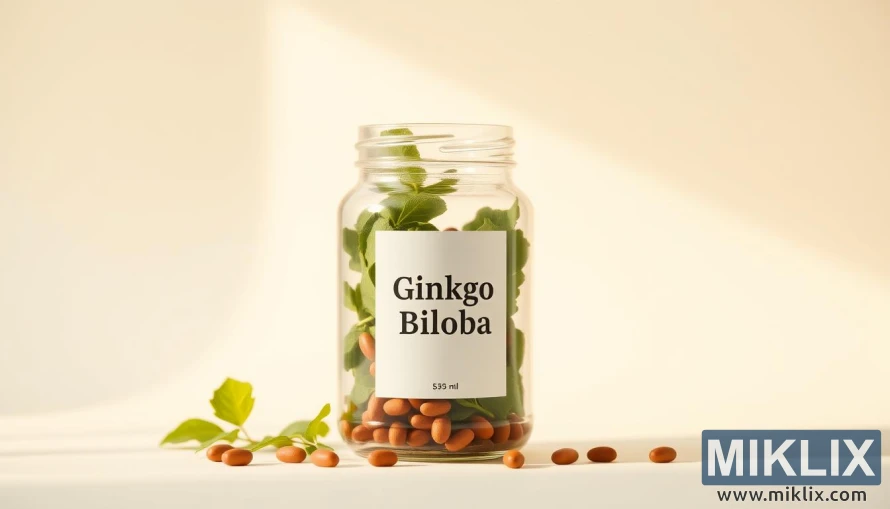Ginkgo Biloba Benefits: Sharpen Your Mind the Natural Way
Published: July 2, 2025 at 12:27:34 PM UTC
Ginkgo Biloba, an ancient tree species, has been valued for its health benefits for centuries. Derived from the Ginkgo tree leaves, these supplements are becoming popular. They are known for their effects on memory, circulation, and cognitive function. As research into Ginkgo Biloba continues, it's important to understand its health benefits for those considering supplements. This herb, rich in history, offers a modern approach to health and wellness.

Key Takeaways
- Ginkgo Biloba is recognized for its memory support and cognitive enhancement.
- The supplement may improve circulation, contributing to overall heart health.
- Scientific research on Ginkgo Biloba is ongoing, revealing mixed results.
- This herbal remedy has been used for centuries in traditional medicine.
- Understanding Ginkgo Biloba's benefits promotes informed health decisions.
Overview of Ginkgo Biloba
Ginkgo Biloba, also known as the maidenhair tree, hails from China and has been a cornerstone in traditional medicine for millennia. Its leaves are the primary source of its medicinal extracts, renowned for their health benefits. For centuries, both the seeds and leaves have been used to treat a variety of conditions, focusing on improving circulation and cognitive functions.
In today's health conversations, Ginkgo Biloba is often discussed as a key herbal supplement. It's celebrated for its ability to support memory and enhance vascular health. The extraction process targets the leaves, which are abundant in antioxidants and other beneficial compounds. Ginkgo Biloba is available in various forms, including capsules, tablets, and liquid extracts, making it a flexible addition to many health regimens.
Rich in Antioxidants
Ginkgo Biloba is celebrated for its rich antioxidant content, mainly flavonoids and terpenoids. These compounds are vital in protecting the body from oxidative stress caused by free radicals. Free radicals, unstable molecules, can harm cells. As we age, our ability to fight these molecules weakens.
The antioxidant prowess of Ginkgo Biloba has made it a topic of interest in health circles. It may help reduce the risk of diseases, including some cancers. Ongoing research aims to fully understand its benefits. Yet, the high antioxidant levels in Ginkgo Biloba are already a significant draw for health enthusiasts.
Reduces Inflammation
Ginkgo Biloba is known for its ability to reduce inflammation, a key part of the body's immune response. Inflammation is a natural reaction to injury or infection. Yet, chronic inflammation can cause serious health problems. Research suggests that Ginkgo Biloba extract can lower inflammatory markers in both humans and animals. This indicates its possible role in managing conditions associated with ongoing inflammation.
The anti-inflammatory effects of Ginkgo Biloba come from its various compounds, such as flavonoids and terpenes. These substances help block the production of inflammatory substances. This could be beneficial for those with inflammatory diseases. Despite promising early findings, more extensive human studies are needed to fully understand Ginkgo Biloba's impact on inflammation-related health issues.

Improves Circulation and Heart Health
Ginkgo Biloba is renowned for its role in boosting blood circulation. It is believed to widen blood vessels, thanks to its effect on nitric oxide levels. This action is key in studies on heart disease, showing it can enhance blood flow to organs. Such findings highlight its value for heart health.
The exact ways Ginkgo Biloba works are being studied. It's thought to improve circulation, which benefits heart health. Taking it regularly may enhance vascular function and ensure healthy blood flow.
Ginkgo Biloba and Cognitive Function
Ginkgo Biloba is often highlighted for its possible benefits to cognitive function. Many people turn to this supplement as a natural way to boost memory. Research has looked into its effectiveness, mainly for those experiencing cognitive decline or dementia. The findings, though promising, vary widely across different studies.
Supporters argue that Ginkgo Biloba can enhance several cognitive areas. These include:
- Memory retention and recall
- Focus and attention
- Mental clarity
Yet, the scientific community stresses the need for more research. They seek to understand how Ginkgo Biloba affects cognitive function. The anticipation is high for future studies to shed more light on its role in memory improvement and brain health.
Supports Vision and Eye Health
Ginkgo Biloba has caught the eye of researchers for its possible benefits to eye health. Initial studies suggest it may boost blood flow to the eyes, aiding those with glaucoma. This could mean better nutrient delivery to the eyes, vital for clear vision.
Early research also hints at Ginkgo Biloba's role in slowing age-related macular degeneration. This condition affects many as they age, impacting their vision. While these findings are encouraging, more extensive studies are needed. They will help us grasp how Ginkgo Biloba impacts eye health in people without vision problems.

Psychiatric Benefits and Mental Health
Ginkgo Biloba has caught the eye of researchers for its mental health benefits. Studies show it may help with anxiety and depression. It could be a natural remedy for those with generalized anxiety disorder.
Research also points to Ginkgo Biloba's role in treating depression. It might boost the effectiveness of traditional antidepressants. This could lead to better mental health outcomes for patients.
The exact ways Ginkgo Biloba affects mental health are under investigation. Scientists are looking into its impact on neurotransmitters and its antioxidant properties. These factors could play a role in its psychiatric benefits.
Natural Solution for PMS Symptoms
Research suggests Ginkgo Biloba could be a natural remedy for PMS symptoms. Women often face physical and psychological challenges during their menstrual cycles. These include mood swings, cramps, and fatigue. Studies indicate Ginkgo Biloba may help reduce these symptoms.
A controlled study found participants using Ginkgo Biloba supplements experienced less emotional and physical PMS symptoms. While these results are promising, more research is needed to confirm the relationship. As interest in natural remedies grows, Ginkgo Biloba emerges as a viable option for PMS relief.
Possible Effects on Sexual Dysfunction
Ginkgo Biloba has caught the eye for its possible benefits in sexual dysfunction, like erectile dysfunction. It may boost blood flow, which is key for sexual health. This could enhance arousal and performance. Studies hint that it might also lift libido, making it a sought-after natural remedy.
Research on Ginkgo Biloba's impact on erectile dysfunction is mixed. Some studies suggest it might not offer much more than a placebo for many. Users should be cautious, as it can interact with certain medications, affecting their effectiveness.

Improves Asthma and COPD Symptoms
Ginkgo Biloba has caught the eye for its possible benefits in managing asthma and COPD symptoms. Studies suggest it may improve respiratory function due to its anti-inflammatory effects. For those with asthma, inflammation in the airways can worsen their condition. Ginkgo Biloba's ability to lower inflammatory markers could offer relief.
In COPD, chronic inflammation is a major factor. Combining Ginkgo Biloba with conventional treatments has shown promise. Research indicates a decrease in inflammation among those treated with Ginkgo alongside standard therapies. Yet, more research is needed to fully grasp Ginkgo Biloba's role in easing asthma and COPD symptoms.
Ginkgo Biloba and Headache Relief
Ginkgo Biloba has caught the eye for its possible role in easing headaches, including migraines. Its anti-inflammatory and antioxidant properties might help lessen headache frequency and severity. Common headache triggers like stress and blood vessel constriction could be mitigated by Ginkgo Biloba.
While there's not much research on Ginkgo Biloba for headaches, its ability to improve blood flow and reduce inflammation might offer some relief. Many people find natural remedies helpful, and Ginkgo Biloba could be one of them for managing headaches.
Those looking into Ginkgo Biloba for headache relief should talk to healthcare experts first. More studies are needed to fully understand its benefits. It could become a significant area of study for headache and migraine treatments in the future.
The Safety and Side Effects of Ginkgo Biloba
Ginkgo Biloba is renowned for its health benefits, but it's important to understand its safety and possible side effects. It is generally considered safe for most people when used in moderation. Yet, some may encounter side effects. These can include stomach issues, headaches, dizziness, and skin allergies. It's critical for anyone thinking about using Ginkgo Biloba to be aware of these risks.
Another concern is the interaction with other medications. Ginkgo Biloba can negatively affect blood thinners, certain antidepressants, and other drugs. People with specific health conditions or those on multiple medications should talk to a doctor before starting it. This step is key to using Ginkgo Biloba safely and avoiding health complications.

Dosage and Forms of Ginkgo Biloba Supplements
Ginkgo Biloba supplements come in various forms, making it easy to find the right one. You can choose from capsules, tablets, liquid extracts, or even dried leaves for tea. Each form offers a unique way to incorporate Ginkgo Biloba into your daily routine.
- Capsules
- Tablets
- Liquid extracts
- Dried leaves for tea
The recommended Ginkgo Biloba dosage is between 120 to 240 milligrams daily. Your specific needs may differ, so it's wise to consult a healthcare professional. They can help determine the best dosage for you. It's also important to avoid consuming raw Ginkgo seeds, as they can be toxic.
Historical Context and Significance of Ginkgo Biloba
Ginkgo Biloba is an ancient tree species, often called a "living fossil." Its history in ancient China spans thousands of years, making it a key part of traditional medicine. The tree's unique fan-shaped leaves have captivated botanists and herbalists for centuries.
In traditional medicine, Ginkgo Biloba was prized for its health benefits, focusing on brain function and blood flow. It was introduced to Western medicine in the late 17th century. European botanists were intrigued by its medicinal properties.
Over time, Ginkgo Biloba became a popular natural remedy in the West. The 20th century's research reinforced its therapeutic value, mirroring its long-standing use in Asia. This blend of ancient knowledge and modern science has shaped our understanding and use of Ginkgo Biloba today.
Conclusion
Ginkgo Biloba stands out as a remarkable herbal supplement, boasting a wide range of health benefits. It enhances cognitive function, supports vision, and improves circulation. Its applications are vast and impactful. As research advances, Ginkgo Biloba's historical significance in traditional medicine is being reevaluated through modern scientific studies.
When considering Ginkgo Biloba supplements, it's vital to be aware of both the advantages and the risks. Always consult with healthcare professionals before integrating these supplements into your routine. This approach ensures safe and effective use, allowing you to fully benefit from Ginkgo Biloba's health advantages.
Reflecting on Ginkgo Biloba's role in your lifestyle, remember that knowledge is essential. Balancing its health benefits against any side effects will guide you in making informed decisions about this potent herbal remedy.
Further Reading
If you enjoyed this post, you may also like these suggestions:
- Layers of Goodness: Why Onions Are a Superfood in Disguise
- Unlock Calm and Vitality: How Ashwagandha Enhances Mind, Body, and Mood
- Gut Feeling: Why Sauerkraut Is a Superfood for Your Digestive Health
